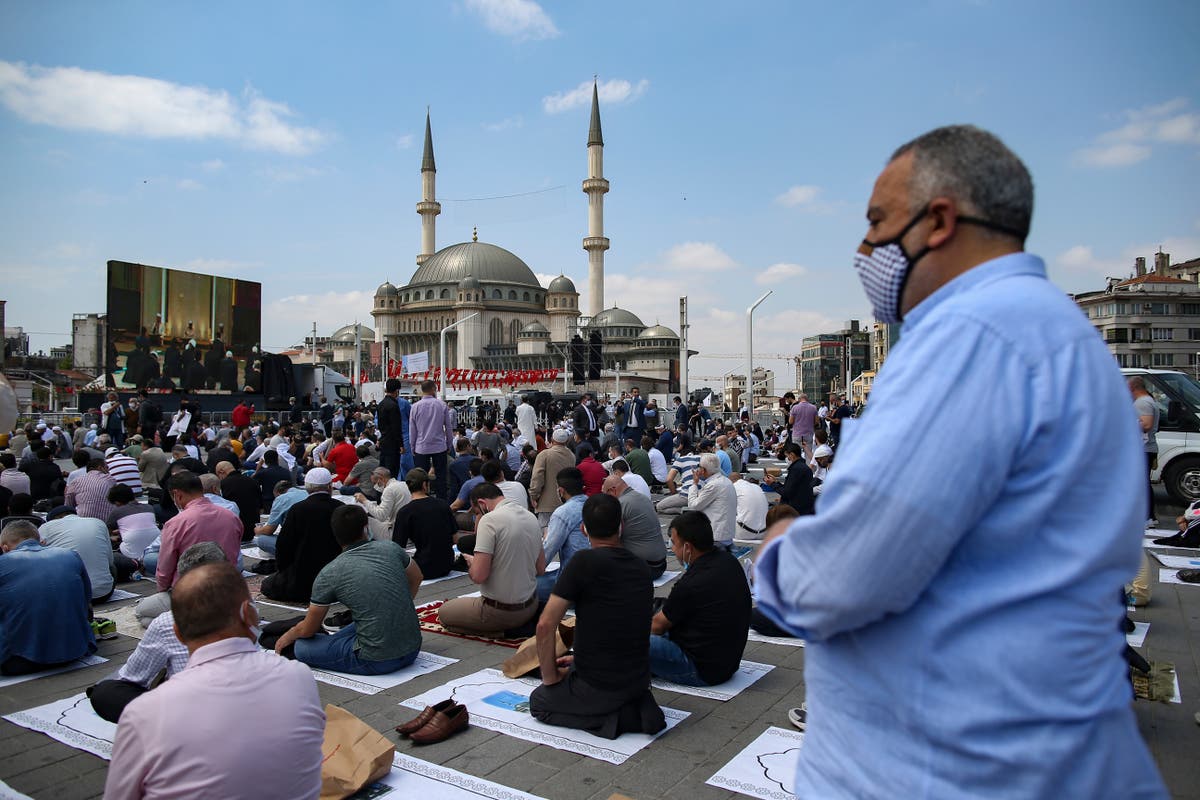
Turkish President Recep Tayyip Erdogan inaugurated a landmark new mosque on Istanbul’s Taksim Square on Friday, fulfilling a long-time ambition to build a Muslim house of worship in the city’s main public space that has become a symbol of the modern Turkish Republic.
Erdogan joined dozens of mask-wearing worshippers for the first prayers at the towering 3,000-capacity mosque on Taksim — which was also the site of the mass anti-government protests in 2013 sparked by the government’s construction plans at the adjacent Gezi Park. Hundreds of others performed their prayers outside the mosque.
The Turkish leader, who has steadily consolidated power in his 18 years in office, had long promised supporters of his Islam-oriented ruling party a mosque on Taksim, saying it is inconceivable for Istanbul’s main square not to have one.
Critics, however, see the mosque’s construction as being part of Erdogan’s plans to undermine the legacy of Mustafa Kemal Ataturk who established the secular-oriented republic after the collapse of the Ottoman Empire. A cultural center at Taksim, which was named after Ataturk and seen as a symbol of his heritage, has been demolished and is being replaced by a new structure that will hold an opera house.
“Taksim Mosque was brought to our Istanbul following a nearly one-and-a-half century struggle,” Erdogan said in a speech following the Friday prayers, insisting that plans for the mosque date back to a Russian-Turkish war between 1877-1878.
It’s the third landmark mosque Erdogan has inaugurated in Istanbul. The massive Camlica Mosque, erected on a tall hill, opened its doors in March 2019. Last year, Erdogan converted the Hagia Sophia — the city’s iconic Byzantine-era cathedral that was turned into a mosque before becoming a museum — back to an Islamic house of worship.
“From patronizing large, symbolic mosques in the city of his birth — which already has three ‘Erdogan’ mosques … to placing religion at the heart of Turkish society, Erdogan now appears determined to leave his indelible mark on his country,” said Soner Cagaptay, an expert on Turkey at the Washington Institute and author of the book “Erdogan’s Empire.”
Erdogan himself described the Taksim mosque as the “third sentimental legacy” and said he hoped it would “illuminate our city like an oil lamp for centuries to come.”
The mosque’s construction was blocked by several court actions over the years, Erdogan said. In 1997, Turkey’s military leaders had pressured an Islamist-led government — which Erdogan belonged to — out of power for allegedly undermining secular laws, citing its declared plans to construct a mosque on Taksim as one of the reasons.
“For years, since my childhood, they have said ‘you cannot do it,’” Erdogan told ruling party regional leaders in a speech Thursday. “But God has destined us (to build) this.”
For decades, the bustling square has been the heart of the city’s cultural scene but also the site of street battles between police and demonstrators. In 1977, 34 people were killed in the square during a May Day commemoration when shots were fired into the crowd from a nearby building.
The 2013 protests against Erdogan’s rule, grew from a sit-in demonstration by a group of protesters trying to prevent plans to demolish Gezi Park. A dozen protesters were killed and thousands were injured during the nationwide protests. Authorities have declared Taksim off-limits to demonstrations in recent years.
Erdogan claimed the Gezi protests were part of a plot to prevent the mosque’s construction.
“When we mobilized once again in the year 2013 as prime minister, with the same goal (to build a mosque in Taksim,) we were faced with the Gezi events,” Erdogan said. “The moment when those terrorists stood against us.”
__
Suzan Fraser reported from Ankara, Turkey.








